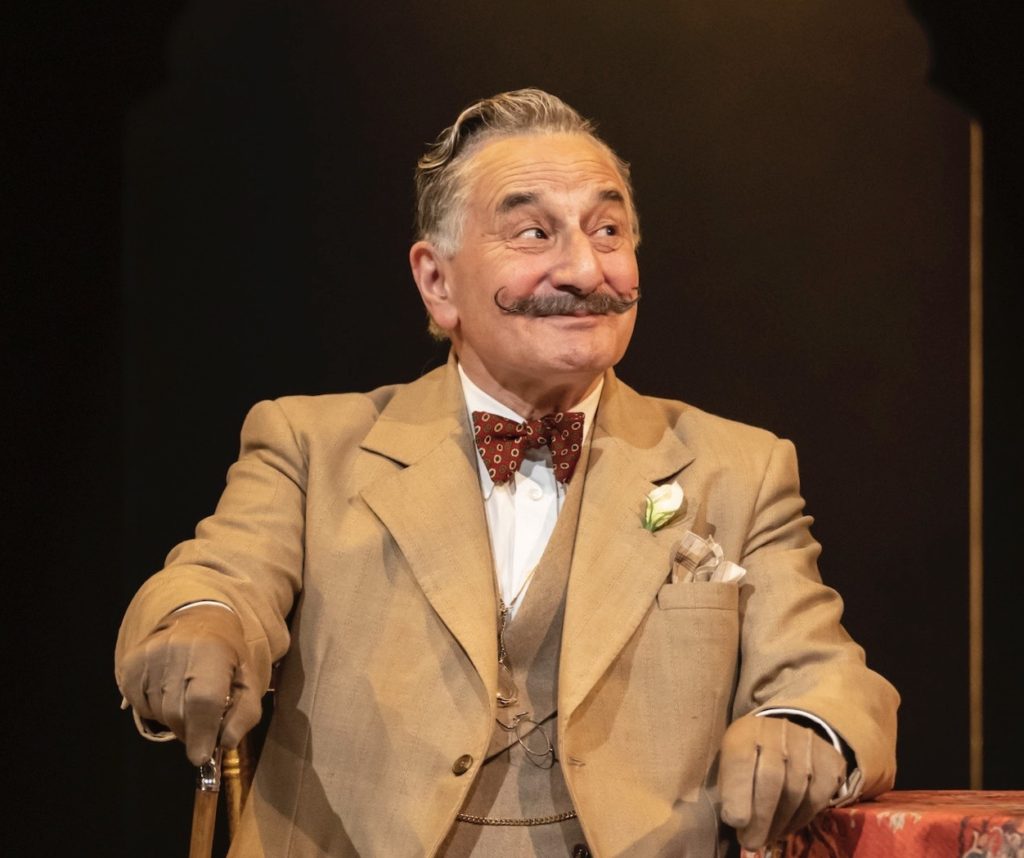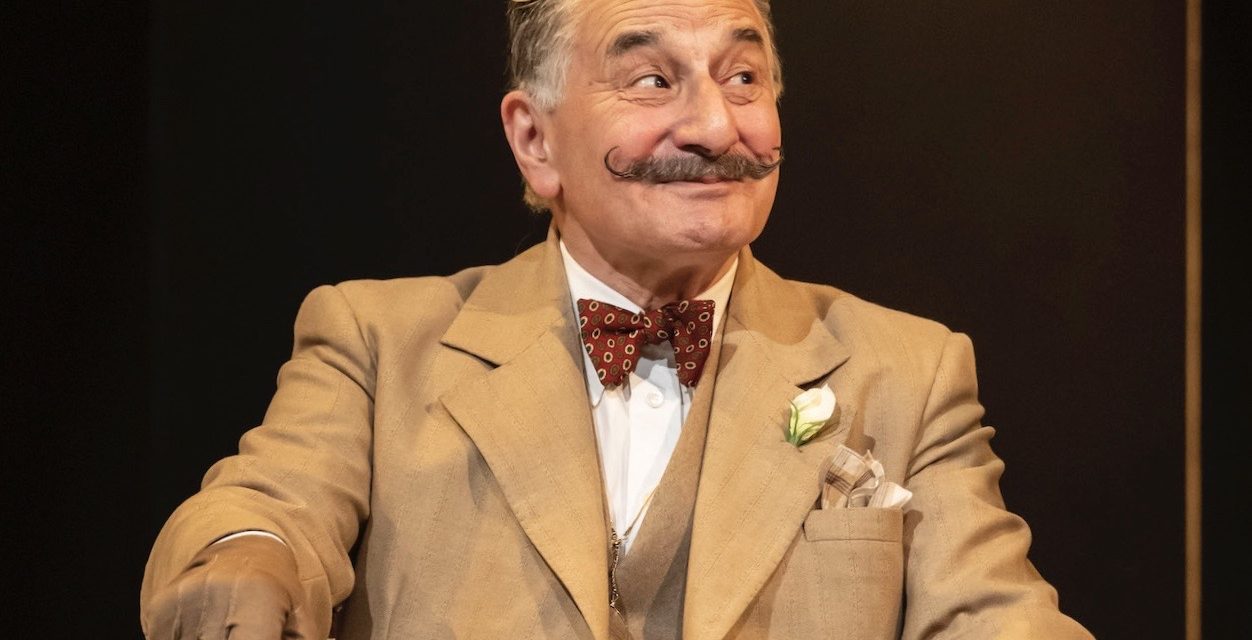
A BRAND-NEW STAGE PRODUCTION OF MURDER ON THE ORIENT EXPRESS IS BOUND FOR BATH WHERE IT TAKES TO THE STAGE FROM 9th to 25th JUNE. AT THE START OF REHEARSALS, FIONA MOUNTFORD SAT DOWN TO PUZZLE THINGS OUT WITH DIRECTOR JONATHAN CHURCH, ADAPTOR KEN LUDWIG AND ACTOR HENRY GOODMAN WHO STARS AS HERCULE POIROT.
What is the perennial appeal of Murder on the Orient Express?
Jonathan Church: From a Poirot perspective, it’s the only one where he… I probably shouldn’t say that! The answer to the question of whodunnit is the most complex. Like the other great popular Agatha Christie novel, Death on the Nile, it’s the very location that in some way summarises everything about a period, a class, the appeal of Downton and so on. It’s all condensed into the train itself.
Ken Ludwig: It’s such an exotic world. I think people love it because it’s so romantic. The clothes are beautiful, it’s a setting we all want to live in, like Downton. It’s a world we fantasise about and we get to spend two glorious hours there.
Henry Goodman: It is brilliantly and carefully written. The journey it takes you on is so beguiling that you’re charmed.
How much of a Christie fan were you coming into this?
Jonathan Church: I fell in love with the genre of crime fiction as a teenager. I read Agatha Christie, Conan Doyle and the American teenage equivalents like Nancy Drew and the Hardy Boys. There is the challenge of trying to work it out, seeing if you can get ahead, the joy of realising you were right and the glorious frustration of realising you were wrong.
Henry Goodman: As a young man, I was too self-absorbed reading Strindberg and Camus. I came to Christie in later life and on the one hand the books scared the hell out of me, because they mean so much to so many people. I was recently interviewed by someone who said, ‘There is no way that Poirot could be like this or this. How are you going to do it?’ So I said, ‘Yes, there’s the issue’. But what’s wonderful is that people care so much about it.
How influenced have you allowed yourselves to be by previous versions of this story?
Ken Ludwig: You can’t discard previous takes – the Finney film was a masterpiece. Yet there was a desire to make it feel original and fresh, to tell it for a new generation of audiences.
Jonathan Church: This is the first time the novel has been adapted for the stage in Europe, so of course there was the question of how you interpret it theatrically.
Henry Goodman: I knew the films and previous versions, but I didn’t know I was going to be playing the part of Poirot one day, so I hadn’t stored that information. When I came to re-read the novels, I was looking at it unequivocally through the lens of this production. I remember when I did Richard III or Shylock or Sir Humphrey in Yes Minister, all these iconic characters, you drink in the details of what others did and you might nick the occasional good idea, but that’s not the point. What matters is the very essence that makes the character survive again and again. To me the essence of Poirot is he represents hope and a love of order.
Ken, what were the key creative decisions you made for your adaptation?
Ken Ludwig: One of the basic ones is that in this Poirot story there are 12 major suspects. I reduced the number – I won’t say by how many – simply because on stage I can’t have 12 suspects plus the other people, because the play will never get produced!
Jonathan Church: The benefit of Ken condensing the numbers is you’re not as broadly spread and you get to know fewer people better. In the book, Christie didn’t investigate the moral dilemma, which is a brilliant final plot twist. Ken has chosen to investigate that. So, between Henry and Ken there is something that isn’t in the book that we’re trying to pull out for an audience now.
Ken Ludwig: The novel gives more backstory, but I plunged in as plays need to do.
Henry Goodman: What’s exciting is that the audience is kept moving in terms of the relationships, the story. This adaptation says to the audience, ‘Sit up, here we go!’.
Ken Ludwig: The play is meant to move like a train.
What were the biggest challenges you faced in adapting a book that is inevitably very detail-heavy?
Ken Ludwig: You’re right on the button. That was the tricky part. Doing a play set on a train has logistical issues. When are you in compartments? Does it move throughout the train? If so, does that raise enormous set problems? I tried to visualise what was going on and make sure that had some sense of reality in terms of staging. The way you convey all the description that is in the book is through the characters, their joyousness and quirkiness.
Henry, what was your point of entry into the character of Poirot?
Henry Goodman: Start with the text and what it provokes. Poirot is an expert in cutting through the carapace of class and style. All through the novels, he’s not impressed by the British class system. The issue of his being a foreigner, a Belgian, releases the juices in me. It makes him watchful and wary, as anyone who senses they’re an outsider would be. He is a man who has spent his life being a detective with a conscience; he says in one novel, ‘If I cannot be the agent of God, I’ll be the agent of good’. Some people have heightened the backstory, but we don’t get into that. If I’m going to do my job properly, I need to embrace the style and momentum of this situation, but to uphold those qualities which are unique to him. The other point that occurs to me is he’s had to deal with fame all his life.
How much of a challenge is it to take on such an iconic character?
Henry Goodman: It can at times be a bit overwhelming, I’d be lying if I said otherwise. But I’ve learnt over the years to trust my instincts.
If one were to play devil’s advocate, what are you trying to avoid in the production? What are the inherent pitfalls?
Jonathan Church: The trap is to believe it can exist in the same way that we know it on film. We all know it’s easier to do novels on film than on stage. What we don’t want is something that isn’t inherently theatrical.
Ken Ludwig: For me there was a consciousness of wanting to make this an occasion. This was Poirot’s greatest case. That was important to me.
Jonathan Church: That’s a really good way of looking at it.
Henry Goodman: I hope to avoid the danger of losing the man in the manner. I hope to embrace intimacy in the exotic environments of this fantastic story.
How crucial is the design going to be to this production?
Henry Goodman: I must say that the unspoken presence in this room is the entire design department.
Jonathan Church: Design is hugely important. You need to create the impression of a train and the geographical relationship between compartments, but also allow an audience in. That’s fundamentally not naturalistic.
What surprises do you have in store for us?
Jonathan Church: I hope there are some visual and aural surprises. I think one of the surprises will be the wit and fun of the adventure of the evening.
Henry Goodman: Delight! A feast of fun!
–––––––––––––
Murder On The Orient Express appears at the Theatre Royal Bath from Thursday 9th to Saturday 25th June. Tickets are on sale at the Theatre Royal Bath Box Office on 01225 448844 and online at www.theatreroyal.org.uk
© Fiona Mountford
Fiona Mountford is a journalist and was Theatre Critic of the London Evening Standard, 2002-19.


